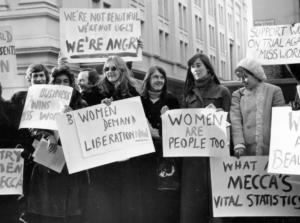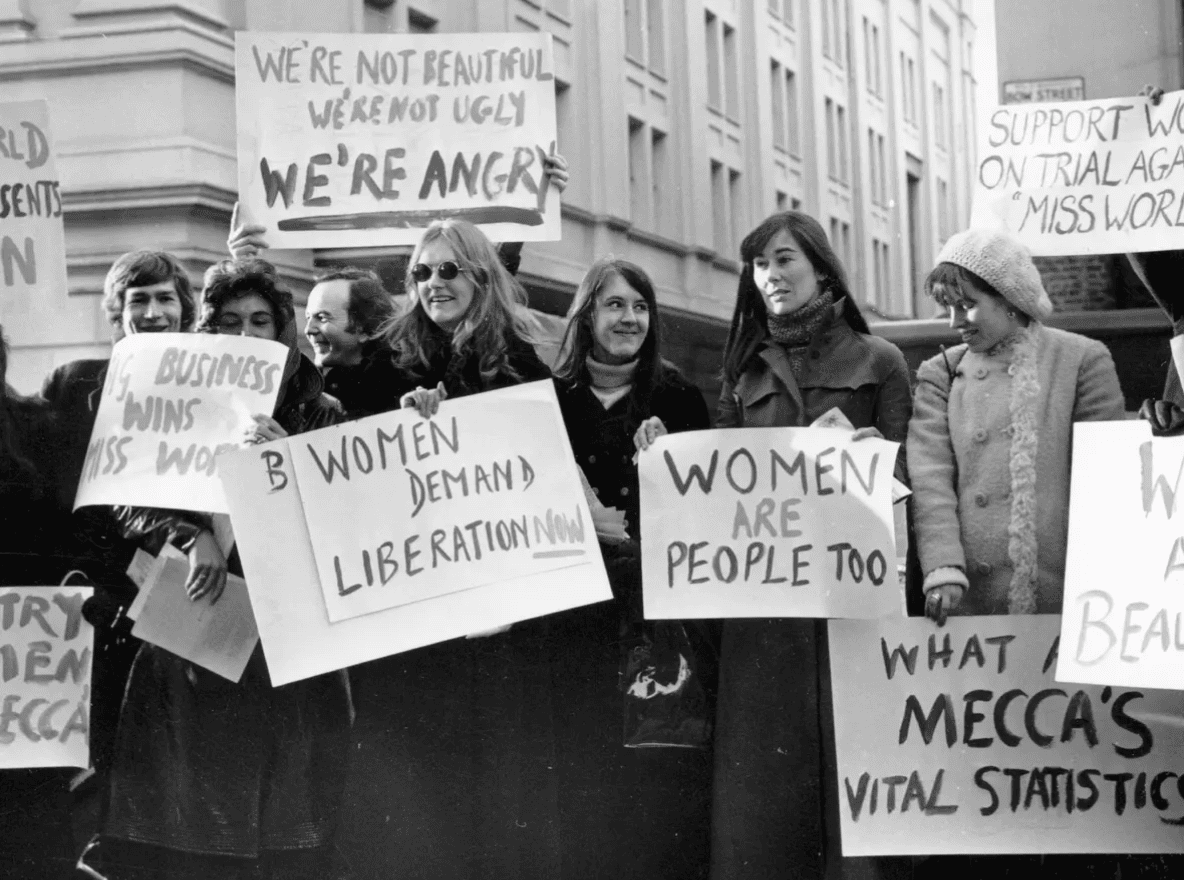
Credit: The Guardian
The current internet discussions about stay-at-home mothers, trad wives and “girls’ girls” have once again generated debates about the nature of feminism and the understanding of women’s choices within the framework of feminist activism.
In recent past decades, choice feminism has been the dominant orientation of the mainstream feminist movement. The term, coined by American lawyer Linda Hirshman, is used to describe the neoliberal individualistic vision of feminism, which puts an emphasis on women’s freedom of choice. A woman’s choice is a feminist choice if she is free to make it, thus it is an expression of her liberation. This celebration of choice is pushed by mainstream media, public figures and corporations and has infiltrated every conversation in and about the women’s movements, from abortion to the decision to wear makeup to sex work. Every choice a woman makes is for herself as long as she makes her decision with a certain political consciousness (whatever that means).
In this case, we easily understand why choice feminism appeals to the broadest audience. It is a palatable version of feminism that’s very lazy and simplistic. It requires no effort, no work on oneself while absolving our actions of any judgments and ourselves of any responsibilities for our actions. We do not need to do any of the work of deconstruction and deprogramming that feminism asks from us. This is why choice feminism often ends up promoting essentialist views on gender and filling the pockets of corporations.
On social media, it is now common to encounter posts asserting that ‘feminine’ things are inherent to the experience of being a woman. “Make-up is the best part of being a girl,” “connect with your divine femininity,” “boys will never know what it is like to spend hours doing their skincare,” and so forth. With choice feminism, advertisers benefit from the association of consumerism with womanhood. It allows them to market products as “women’s” products but with a feminist twist.
As women have long been told to prioritize men’s needs before theirs, “feminine” products are promoted as an occasion to treat themselves. I buy beauty products and it makes me happy because I’m doing something for myself and not for a man. I am putting myself first “because I’m worth it,” as the L’Oréal tagline goes. It doesn’t matter that since my childhood I have been the target of invasive advertising campaigns or that the beauty industry is mainly owned by greedy men. I’m free to spend hundreds on my appearance because I decide for myself only. Pushed to the extreme, choice feminism can validate the choices to follow extreme diets or to do plastic surgery under the guise that “you do it for yourself and not men.” This is ridiculous, of course, and fuels the main criticism of choice feminism.
Choices are not made in a vacuum. Under the patriarchy, we have a limited set of predetermined choices to choose from if we want to avoid retaliation. When we make choices that divert from patriarchal expectations, we expose ourselves to violence, shame and rejection from others. Also, factors like race, class and sexuality affect women’s choices. For the most oppressed, some “choices” are not even options. We don’t all have the possibility to imagine a world of better alternatives.
However, choice feminism ignores those structural issues and societal pressures that feminist movements have historically fought against. Using, again, the examples of extreme diets and plastic surgery, it is not possible to validate a woman’s choice to engage in those without having the necessary conversations about the unachievable beauty standards imposed on women.. But choice feminism makes it impossible to have those uncomfortable, but necessary conversations about feminist activism. It shuts down any sort of judgment or negative critique under the assumption that women, with a vague political consciousness, cannot contribute to their own oppression. In reality, women can have internalized misogyny. They can make choices that disadvantage women as a whole and benefit the status quo of patriarchal domination.
There is this weird reversal of the situation where the women who criticize choices that align with patriarchal expectations are othered. They are the enemies, the ones with internalized misogyny, the “pick me’s.” Choice feminism seeks to unite by avoiding conflicts, not realizing that feminism, as an ideology strongly tied to social activism, is going to generate debates accompanied by conflicts. “The personal is political” means that nothing is left untouched by the feminist eye, even the things that are very dear to us. Inserting ourselves in the personal is always going to lead to disagreements because, well, we all have different opinions on things. If we are scared of having these conversations it may be because we are scared of what they may reveal. Scared to realize that, despite some belief that feminism has run its course, we are not as free as we think we are. Post-feminism is not a thing and the patriarchy is still very much alive and impacting us.
All in all, choice feminism does nothing but divert us from feminism’s end goal that is dismantling the patriarchy. An individualized view of political activism is never going to work when we need collective action for structural change. Acting as a collective requires an understanding of what our actions imply for the status of women in society. Liberation or domination? The reality is that some choices align more with the goals of the feminist movement than others. As feminists, we should prioritize decisions that challenge the existing framework of patriarchal domination instead of the ones that maintain it. Choice feminism works for women who want reassurance from feminism rather than liberation. But if it does work for them, it’s because they probably haven’t understood yet what feminism really is about.
Despite the insistence of commercials, political campaigns’ slogans and Instagram hashtags, I don’t believe that feminism is (only) supposed to be this empowering, feel-good, girl-boss thing. Feminism is liberating but also a source of anger. To be a feminist is to be enlightened and to be enlightened is to see sexism even in the places in which it is very well hidden. A woman who has gained political consciousness through feminism and is now aware of the extent of women’s subordination can only be enraged at the inaction of the rest of society and the persistent struggles of women. Choice feminism softens the revolutionary aspect of the movement but in the process destroys the essence of its former demands. What is the point of fighting if we do not remember the reason for our fight?
Other posts that may interest you:
- The Trouble with ‘Ecocide’
- Carbon dioxide removal – hit or miss?
- Local Victories for Turkish Opposition — A Sign of Hope?
- Are France and Japan a Mismatch Made in Heaven?
- A Reflection on Dark Tourism
Discover more from The Sundial Press
Subscribe to get the latest posts sent to your email.





